 Petzlover
Petzlover Bulgarian Shepherd is originated from Bulgaria but Lhasapoo is originated from United States. Bulgarian Shepherd may grow 47 cm / 19 inches higher than Lhasapoo. Bulgarian Shepherd may weigh 51 kg / 113 pounds more than Lhasapoo. Bulgarian Shepherd may live 42 years more than Lhasapoo. Bulgarian Shepherd may have more litter size than Lhasapoo. Both Bulgarian Shepherd and Lhasapoo requires Moderate Maintenance.
Bulgarian Shepherd is originated from Bulgaria but Lhasapoo is originated from United States. Bulgarian Shepherd may grow 47 cm / 19 inches higher than Lhasapoo. Bulgarian Shepherd may weigh 51 kg / 113 pounds more than Lhasapoo. Bulgarian Shepherd may live 42 years more than Lhasapoo. Bulgarian Shepherd may have more litter size than Lhasapoo. Both Bulgarian Shepherd and Lhasapoo requires Moderate Maintenance.
 The Bulgarian Shepard Dog comes from the ancient line of Molossers of Central Asia and Tibet, and the shepherds of the Balkans, Turkey and Caucasus. Among the oldest and most valued of the working dogs of Europe, the Bulgarian Shepherd breed was created by mixing the Balkan breeds with the dogs from Central Asia by the proto-Bulgarians around the 7th century. The Karakachanskoto Kuche was introduced to Bulgaria and accepted by the sheep herders. Mixing this breed in with the Balkan and Central Asian mix developed the Bulgarian Shepherd we know today. In the long run the original Karakachanskoto Kuche became extinct, replaced entirely by the Bulgarian Shepherd even in places where the new breed is still called by the Kuche name. Although the breeds are not the same, most of the dog world does not know the difference.
The Bulgarian Shepard Dog comes from the ancient line of Molossers of Central Asia and Tibet, and the shepherds of the Balkans, Turkey and Caucasus. Among the oldest and most valued of the working dogs of Europe, the Bulgarian Shepherd breed was created by mixing the Balkan breeds with the dogs from Central Asia by the proto-Bulgarians around the 7th century. The Karakachanskoto Kuche was introduced to Bulgaria and accepted by the sheep herders. Mixing this breed in with the Balkan and Central Asian mix developed the Bulgarian Shepherd we know today. In the long run the original Karakachanskoto Kuche became extinct, replaced entirely by the Bulgarian Shepherd even in places where the new breed is still called by the Kuche name. Although the breeds are not the same, most of the dog world does not know the difference.
In Bulgaria however the Karakachan is a national treasure and the history of the breed runs deep. One Kuche could run up to 1200 animals and hundreds were used by the herdsmen in the mountains of Bulgaria. There were many regional types of Bulgarian Shepherds with very little difference between those types. These dogs were so prized by the shepherds that the dogs ate first before the people. The dogs however ate a vegetarian diet of milk, wheat, water and oats. The Bulgarian Shepherd lives a long life of often over 20 years. The Bulgarian Army made good use of these dogs early in the 20th century.
Following World War II, the wolves were close to extinction and property in Bulgaria was nationalized. There was no longer a need for a large force of working dogs. The Communist government exterminated large numbers of sheep dogs including the Bulgarian Shepherd. Only those species on government owned farms and in remote regions survived. When the government farms were disbanded in the early 20th century, these dogs were exterminated as well. Only those in the mountains survived. Commercial breeding of the Bulgarian Shepherd in the end of the century has resulted in controversy as other breeds came into the breeding program.
Use of breeds such as Sarplaninacs, Caucasian Ovcharkas, St. Bernards, Central Asian Ovcharkas and Bosnian Tornjaks in these programs resulted in Bulgarian Shepherd or Karakachans that were a lot different from the original breed. There is therefore some concern about the future of the breed in Bulgaria, yet they received official Bulgarian national recognition in 2000. Today’s Bulgarian Shepherd is a guard dog for both property and livestock.
The official standard for the breed came about in 1991 and in 2005 it was recognized by the Bulgarian State Commission for Animal Breeds. Only those dogs that meet this standard are considered “true” Karakachans. The Bulgarian Shepherds are willing to fight bears and wolves in defense of its family and flock. The dog is brave and loyal, dignified and powerful. They are recognized by both the Dog Registry of America, Inc. (DRA) and the Bulgarian Republican Federation of Cynology (BRFC) a member of the FCI.
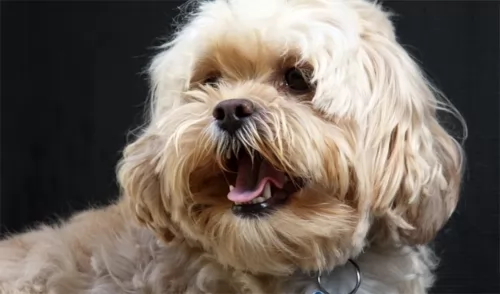 Such a cute, cuddly teddy bear of a dog is popular with everyone who just wants a wonderful canine companion.
Such a cute, cuddly teddy bear of a dog is popular with everyone who just wants a wonderful canine companion.
Both the Lhasa Apso and the Poodle are ancient dog breeds and they are the two breeds that have been used to bring about the Lhasapoo. The Poo has been bred to essentially be an indoor dog.
It would appear as though the Lhasapoo was developed in the United States of America, as in 1933, a pair was given to an American traveler who developed a kennel.
 A massive, powerful and muscular Molosser, the Bulgarian Shepherd is strong, agile, powerful and fast. They are intelligent and reliable. They have a long, thick, harsh coat in white with patches of black. Their skull is massive and broad with a furrowed forehead. The muzzle is massive as well while the nose has wide nostrils and is fairly large. It has close fitting, thick lips with strong, scissor bite jaws. The Bulgarian Shepherd’s eyes are deep, oblique and small. They are either hazel or dark. They have an intelligent and confident, yet firm almost grim expression.
A massive, powerful and muscular Molosser, the Bulgarian Shepherd is strong, agile, powerful and fast. They are intelligent and reliable. They have a long, thick, harsh coat in white with patches of black. Their skull is massive and broad with a furrowed forehead. The muzzle is massive as well while the nose has wide nostrils and is fairly large. It has close fitting, thick lips with strong, scissor bite jaws. The Bulgarian Shepherd’s eyes are deep, oblique and small. They are either hazel or dark. They have an intelligent and confident, yet firm almost grim expression.
Their ears are low set, small and v-shaped. They sit close to the head which sits on a powerful but short neck. They have a broad back, well-muscled body with a deep chest and long, rough tail. Their gait is a trot with a spring in their step. There are two types of coats – longhaired and shorthaired with no undercoats.
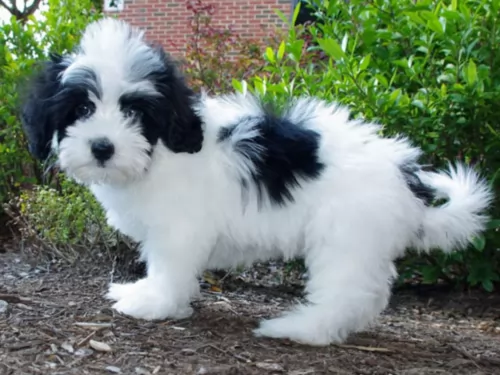 The Lhasapoo is a mix of Poodle and Lhasa Apso. He is a small dog standing between 25–28 cm in height and weighing 4 – 6kg.
The Lhasapoo is a mix of Poodle and Lhasa Apso. He is a small dog standing between 25–28 cm in height and weighing 4 – 6kg.
Known as a designer breed, his small size allows him to adapt to life in the city or to the countryside. He is such a cute little dog with his alert face, his bright brown eyes, short legs and floppy ears.
His coat is thick and dense and can be curly or fairly straight. It comes in a number of solid colors – apricot, tan, cream, brown, white and black or he can be bi-color – any of these colors mixed with white. In fact, as a crossbreed he can inherit the looks of either dogs – the Poodle or Lhasa Poo. Because he has poodle in him, these dogs are sometimes spoken about as being hypoallergenic.
Small and gentle in nature, the Lhasapoo makes a splendid pet and companion for everyone. He is such an amicable small dog, getting on well with both children and other pets in the home.
You can’t really tell what kind of a dog he’ll turn out to be in terms of his character, because he can be quite aloof if the Lhasa side of him is stronger or he could be playful and friendly if the Poodle side of him is stronger.
 This is a working dog, intelligent and independent guard dog. Reserved around strangers but loyal and devoted with his family. Tolerant of children in their family if they were raised with them. Not only will she defend human family members, she will guard and defend household pets as well. He is quite capable of making her own independent decisions. These are very intense guard dogs that will respond aggressively if they think their people are being attacked.
This is a working dog, intelligent and independent guard dog. Reserved around strangers but loyal and devoted with his family. Tolerant of children in their family if they were raised with them. Not only will she defend human family members, she will guard and defend household pets as well. He is quite capable of making her own independent decisions. These are very intense guard dogs that will respond aggressively if they think their people are being attacked.
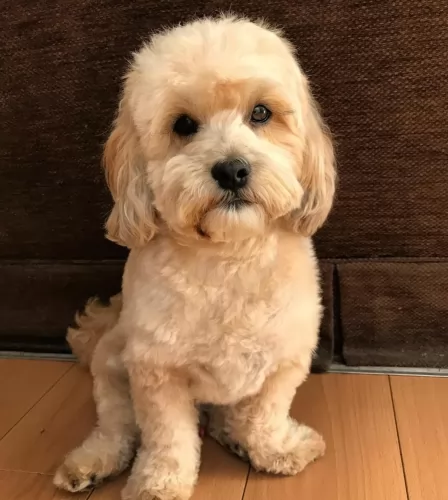 The Lhasapoo is a crossbreed, so you never know what you’re actually going to get – a little bit of Lhasa or a little bit of Poodle.
The Lhasapoo is a crossbreed, so you never know what you’re actually going to get – a little bit of Lhasa or a little bit of Poodle.
One thing is for sure though – you’re going to get the cutest little pet ever. He is a friendly, affectionate dog, but the Lhasa side of him makes him wary of strangers, making him an excellent watchdog.
They have a moderate activity levels and will adapt easily to life in the city or in the countryside, but they will need a walk every day to ensure he doesn’t become unfit and obese.
Lhasapoo puppies are adorable but every cute puppy grows into an adult. Then it’s time to show you’re a responsible dog owner by continuing to love and care for your adult Lhasapoo so that he becomes the wonderful companion he is designed to be.
 The breed itself is known to be healthy but they do face some of the usual health issues of the massive, giant breeds. This includes knee and elbow dislocation; hip dysplasia; bloat; entropion and osteosarcoma. All of these conditions require medical intervention, but bloat and osteosarcoma are the deadliest. Bloat needs immediate attention and osteosarcoma is a deadly bone cancer.
The breed itself is known to be healthy but they do face some of the usual health issues of the massive, giant breeds. This includes knee and elbow dislocation; hip dysplasia; bloat; entropion and osteosarcoma. All of these conditions require medical intervention, but bloat and osteosarcoma are the deadliest. Bloat needs immediate attention and osteosarcoma is a deadly bone cancer.
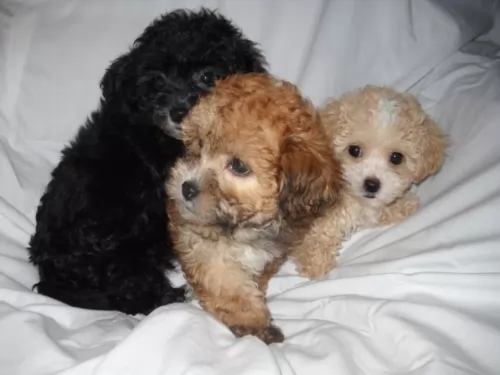 All dogs have the potential to become ill but when you give your dog the best chance to eat well and he is loved and cherished, he can live a long life.
All dogs have the potential to become ill but when you give your dog the best chance to eat well and he is loved and cherished, he can live a long life.
The Lhasapoo can live to be 15 years of age if you treat him well and ensure that he has a healthy diet. Of course as a crossbreed, his chances of developing inherited diseases is limited.
Watch out for Bloat, particularly if your pet gobbles up a large bowl of food. It is better to feed him 2 smaller meals a day. There are some time-releasing food bowls available for pets to encourage slower eating.
With Bloat, you’ll notice your pet’s stomach is swollen up. Complications set in when the stomach turns or twists as fluid and air can’t escape. Your dog will also be restless, drooling and trying to vomit. Bloat is a life-threatening illness.
This can be a complication from disease or medications even. It is important to keep your pet’s teeth healthy as chronic kidney disease can be caused by dental disease too. Bacteria from the diseased teeth and gums enters bloodstream and damages vital organs like the kidneys.
 These are large dogs with large appetites, but you want to keep them lean and active. Feed them at least twice a day with a high quality large or giant dog dry food. Four to five cups of food per day is the maximum.
These are large dogs with large appetites, but you want to keep them lean and active. Feed them at least twice a day with a high quality large or giant dog dry food. Four to five cups of food per day is the maximum.
Patellar Luxation – a floating kneecap or dislocated knee. Will cause lameness.
Osteosarcoma – bone cancer must be treated immediately as it is potentially fatal.
The Bulgarian Shepherd needs a good amount of exercise every day. Remember this is a working breed and they need a job. Long walks every day are essential for his well-being.
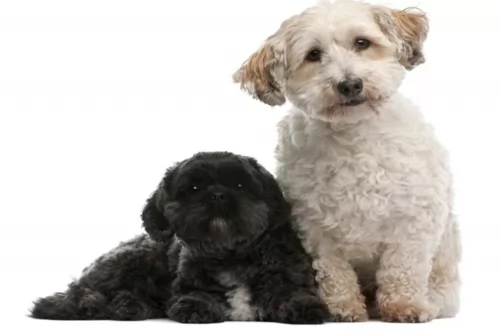 The Lhasapoo is a dog breed that likes to spend time indoors. Because of his looks, his human family members will no doubt be vying for his attention and playing indoor games with him. It will do him good to get out for a walk every day as this gives him the chance to sniff around and smell different things and experience life outside his home.
The Lhasapoo is a dog breed that likes to spend time indoors. Because of his looks, his human family members will no doubt be vying for his attention and playing indoor games with him. It will do him good to get out for a walk every day as this gives him the chance to sniff around and smell different things and experience life outside his home.
The Lhasapoo isn’t a big eater and he will require top quality food for small breeds. He isn’t a big meat eater so a tiny bit of cooked chicken, rice and vegetables chopped up nicely and added to his kibble from time to time will keep him healthy and happy.
Being the crossbreed that he is, you can’t be too sure about the type of coat your Lhasapoo will have. It can be curly, wavy or straight. Most inherit curls.
A Lhasapoo coat looks wonderful when it has been professionally groomed, and then in between grooming, his coat will need to be brushed to prevent tangling. While you’re brushing him, check his eyes too. Sometimes he can develop tear stains beneath the eyes and you can wipe gently around his eyes.
Other grooming for your cute little dog includes having his nails clipped as well as checking inside the ears for infection. Excess wax and dirt can result in an ear infection. You’ll notice your pet shaking his head, the insides of his ears might be red and he wants to scratch his ears. Get him to the vet who will show you how to keep his ears clean and dry.
Also, brush his teeth with special canine toothbrush and toothpaste. Dental disease won’t only damage his teeth, it can cause problems with other parts of the body too.